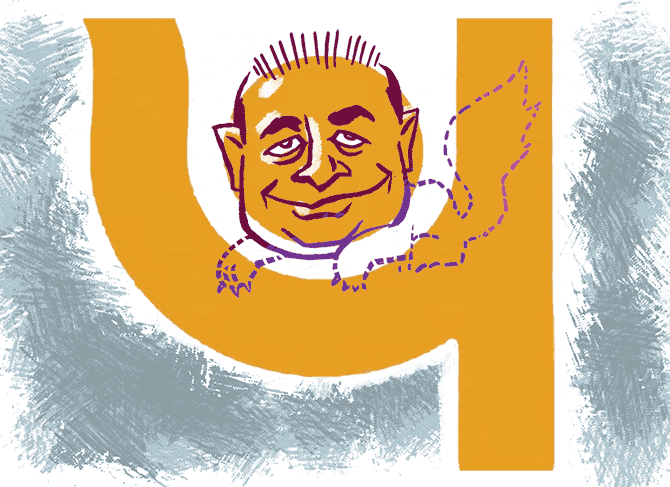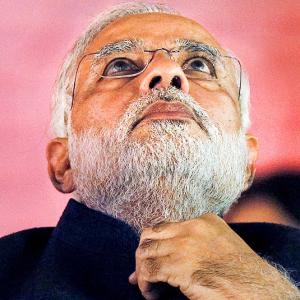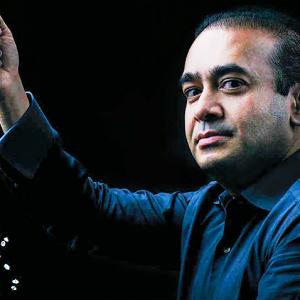Decades apart, but the drama linked to the two appears similar, says Nivedita Mookerji.
Illustration: Dominic Xavier

Nick Leeson, the rogue trader who captured our imagination way back in 1995, has come alive in various conversations ever since the Punjab National Bank-Nirav Modi scam broke.
The two are not quite the same, but the drama linked to any scandal is often similar, if we were to look at how events unfolded and how the authorities reacted.
In the case of PNB, everyone seems to be posing questions to the other at this point.
>The government is asking the regulator Reserve Bank of India why it wasn't able to detect the chain of wrong-doings, the RBI is querying PNB and other bank officials to assess the depth of the scam through a freshly appointed panel, investigative agencies CBI and ED are busy questioning sellers and buyers of jewellery designed by Nirav Modi besides bank executives and the country's anti-graft agency CVC (which is believed to have given out awards to PNB for banking excellence in vigilance last year) is now looking for answers from banks as well as the government.
Meanwhile, Prime Minister Narendra D Modi has remained quiet on the matter.
Finance Minister Arun Jaitley broke his silence almost a week after the scam, and blamed bank management and auditors for the systemic failure.
One was curious about how things turned out when Barings, Britain's oldest merchant bank, failed in early 1995 due to catastrophic losses run up by futures trader Nick Leeson. This is what happened.
There was silence from the authorities there too. The Singapore government spoke up many days after the failure of Barings.
A March 1995 news report says, 'Breaking silence for the first time since the collapse of the British investment bank Barings -- a result of huge losses by a Barings trader here -- the Singapore government defended the integrity of its trading markets'.
The report said the Singapore government also announced a sweeping review of the futures exchange and promised to enact tight new rules for trading companies.
Then Singapore finance minister Richard Hu told parliament that the Singapore International Monetary Exchange Ltd, where the trading originated, was not at risk because of the Barings losses pegged at over $1 billion some 23 years ago.
Hu did not say how the 28-year-old trader for Barings circumvented the safeguards in the system.
Just as SWIFT, Nostro accounts and risk management are being debated at every forum after the PNB scam, regulatory and financial integrity of Simex (the Singapore exchange) was at the centre of narrative post-Barings.
And just like Nirav Modi's men had a free run at PNB, Leeson 'exercised control over both his trading and the back-office accounting operations', reports suggested.
Despite Hu's assurance that Simex was safe, industry leaders argued this was a clear case of absence of head office control by Barings at a time when the derivatives market was growing bigger.
'It is rather incredible that a firm like Barings could not know the position it is building up. And it is also incredible that this is not recognised by Simex,' a banker had noted then.
Then Singapore PM Goh Chok Tong spoke too on the Barings debacle, though very late. He pinned the blame on internal problems and a lack of control in the British investment bank.
He even said that the Singapore government has done very well, referring to the regulator's probe into Barings collapse. Familiar?
If we go back several decades, there was another case of bank failure that had made news in the national media.
Arbuthnot & Co was a mercantile bank, based in Madras (now Chennai). It was founded as Francis Latour & Co in the late 18th century and then it became Arbuthnot De Monte & Co. It failed in October 1906 after a severe financial crisis.
Again, no similarity to the PNB scam, but the drama around the debacle and investor concerns were not too different.
Two partners of Arbuthnot entered into an arrangement with Patrick MacFadyen, who engaged in speculation and lost serious money.
After the bankruptcy, MacFadyen committed suicide, making the fall of Arbuthnot even murkier.
Even at that point, the advice given to the group was that the partners of the firms must try to contain public alarm by 'an honest and open statement of all the circumstances which have led to the disaster'.
Statement or not, there's something about tweets and scam.
A recent tweet by Leeson, in 2015, said, 'Thank god, there was no Twitter in 1995 when I went on the run -- wouldn't have got very far.'
Leeson flew across the globe before he was caught in Germany. Nirav Modi's case has unfolded in the times of Twitter, but there's no official word yet on his location.







